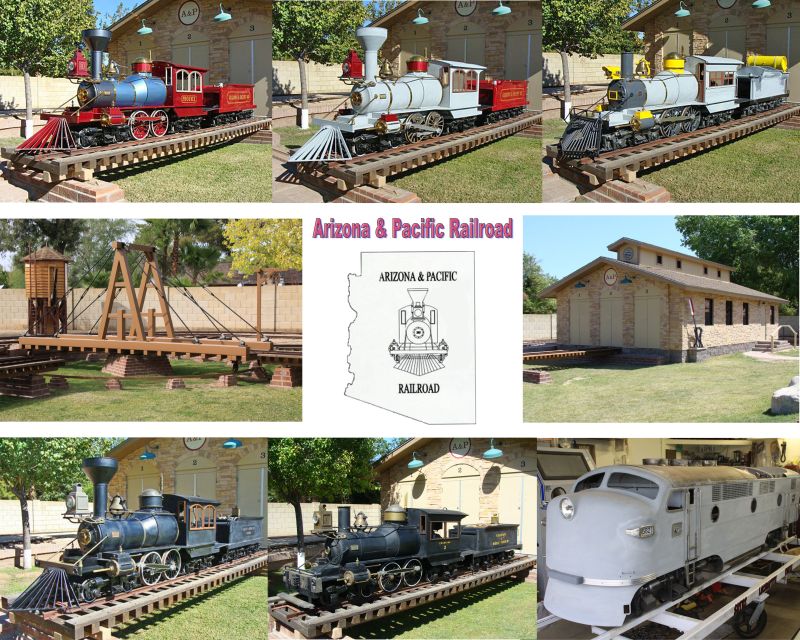
|

|
This is the eleventh year I have written an annual report and every year as I look back on what we accomplished during the prior twelve months, I think it’s been one of the busiest years ever on the A & P. This year isn’t any different; it was a very busy year.
We describe construction projects in this context as brand new construction as part of or adjacent to the right-of-way or that directly relates to the operation of the A & P.
We added walking planks to the transfer table. I have talked for years about adding walking planks to the center of the transfer table and this project had been on our "to do" list for quite some time. We finally got to it this year. The transfer table frequently gets used as a method of entry into the engine house when we are working on a project and planks make much easier walking than the 4 x 4 ties that are spaced for rail support, not for foot comfort. Dave and I got the planks cut and in place and securely bolted just as a major Spring rain storm hit. The new walkway has been in place about eight months and although the planks don't yet exactly match the grey shade of the original wood in the transfer table, they will in a few more months. The planks have already received a great deal of use - I should have added them years ago...
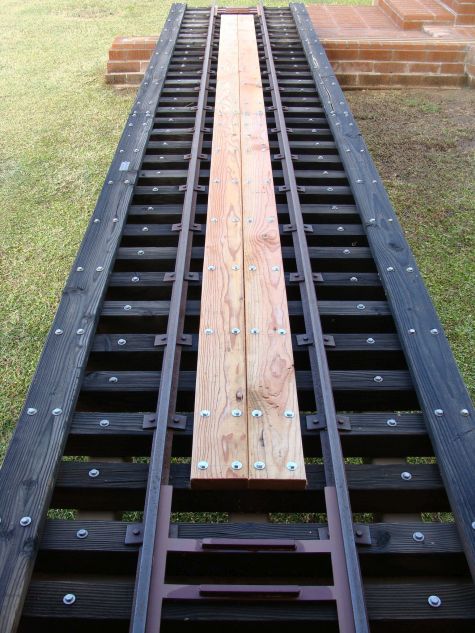
|
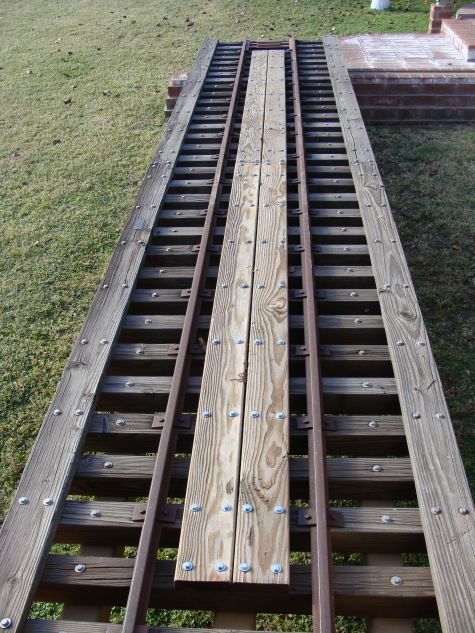
|
We expanded the rear patio deck behind the engine house. The expansion created a new access area for getting off the rear patio deck and into engine house stall number 1 as we are often carrying tools and or parts back and forth. The rear patio of the engine house is about 50 square feet bigger with the strategically placed extension. Like the transfer table planks, it has received a great deal of use in the past few months.
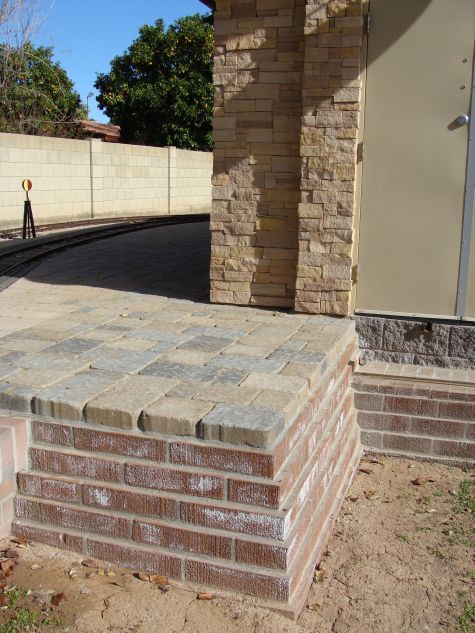
|
Getting No. 582 off of our rack in the garage and down on the rail, created the need to store her in a clean and dry location with rail access. That necessitated cleaning out our original engine house of boxes of parts and one of our two railroad car racks that we had been storing in there. I needed a place to store both of the racks and elected to expand a slab of concrete adjacent to the rail into engine house No. 1.
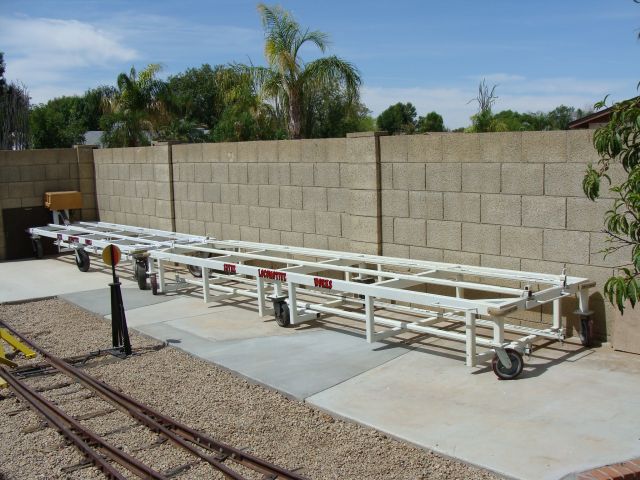
|
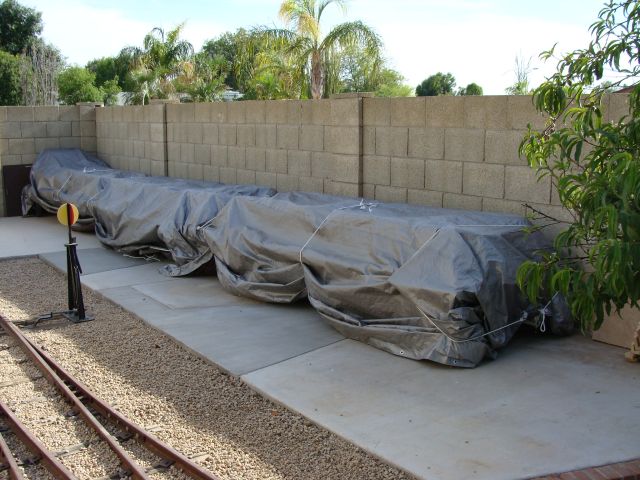
|
The project required relocating one healthy tree and removal of two others that were eaten up by wood bores. We also had to hammer out the three brick planters that we had built around the trees years ago. We got the concrete poured, the racks moved and the boxes of parts sorted and stored other places. No. 582 resides in our original engine house. When we get the B unit ready to sit on the rail, there is enough space for her to sit behind the A unit in the engine house.
We have a collection of 14 full size switch stands scattered around the various patios and display areas on the property. We built new brick displays areas for 5 of our switch stands that allowed me to move them from a gravel location in the side yard and place them nearer the bulk of the full size railroad items and it is easier access for little people as well as older folks.
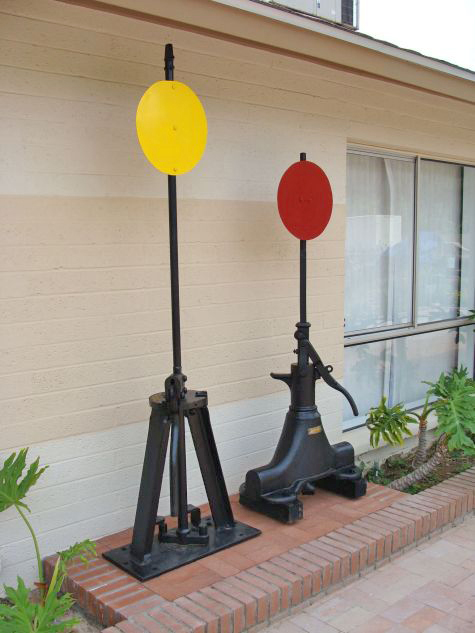
|
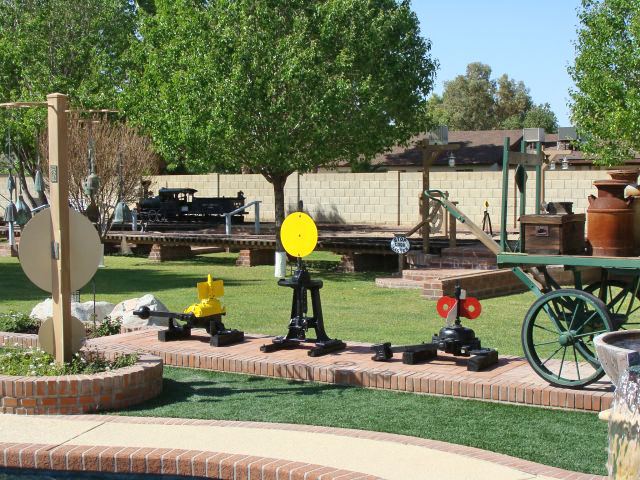
|
We added a small amount of brick work around a post near the pedestrian sidewalk. It was the only one of the many posts here that didn't have brick work of some sort and now it fits in better with the balance of our construction.
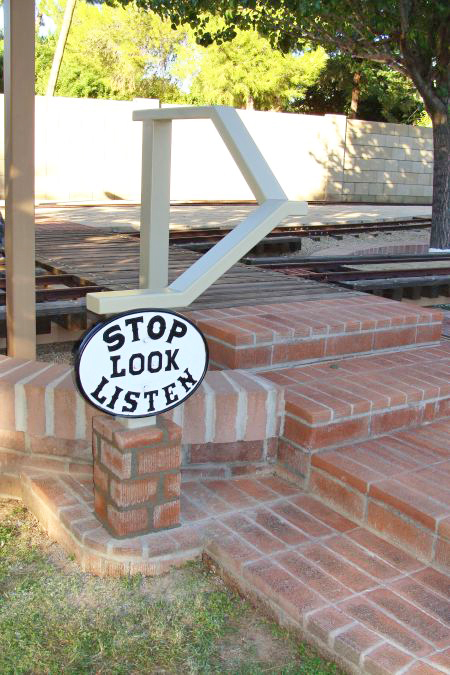
|
We expanded our ramp into the back yard to accommodate the John Deere AMT 600 which is a 5 wheeler. Originally, the ramp was built for heavy items that I would load into the back of my pickup truck to move to various places in the rear portion of the yard. The expanded ramp will still accommodate the truck, but I can also use the AMT to run things back and forth.
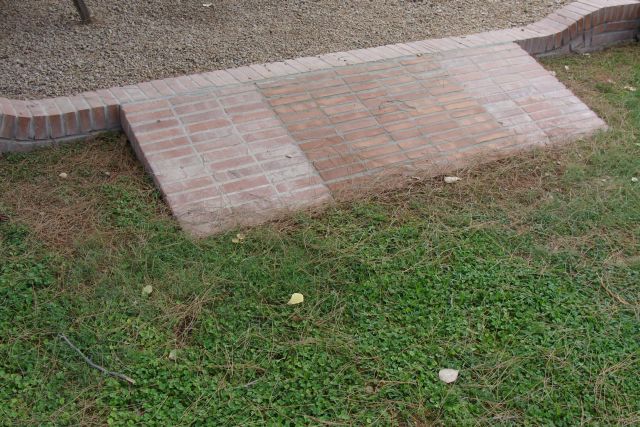
|
We reassembled trestle No 4. I had planned to reposition the trestle and build a pair of diamonds to cross the mainline and siding to access the turntable. After discussing with a number of longtime railroad men, I have decided against that plan. The diamonds in the curve just wasn't a good idea. We reassembled the trestle in its original location.
We finished our extensive work on our curves and welded flat iron between the rails on every third tie in an effort to combat the rail creep we deal with every winter and summer as the weather changes and the rails grow and shrink. We started this project in 2013 and got it finished early this year. We no longer have a rail creep issue and I have been very pleased from a safety and functionality perspective. I do have a wheel squeal issue though as welding the flat bar pulled the gauge about a 16th tighter than the wheels would like on the curves. I could cut one of the welds on each tie bar and regauge, but there are close to a hundred of them that would need cut and I have a great number of projects ahead of that fun job. For now, I will live with a little wheel squeal in the curves.
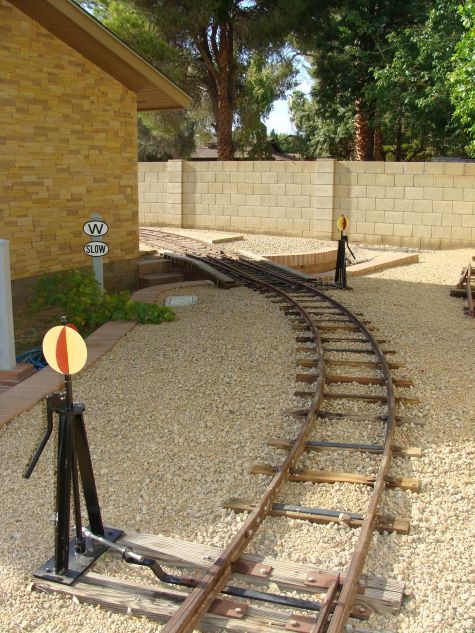
|
There is no end to the maintenance projects out here. The wood items need refinished and repainted every three years. Some of the metal items last a little longer in between paint jobs. All moving parts need lubricated frequently and the heat is tough on all materials.
We refinished our benches and barrels, painted our switch stand collection, lamp posts and railroad telephone booth.
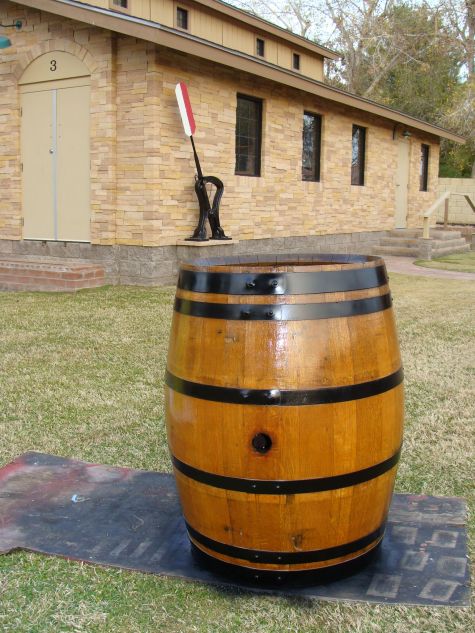
|
We repainted our crossing signal, the wood and metal components of our picnic tables and our retro patio chairs.
We painted our handrails, sign posts and hose bibs.
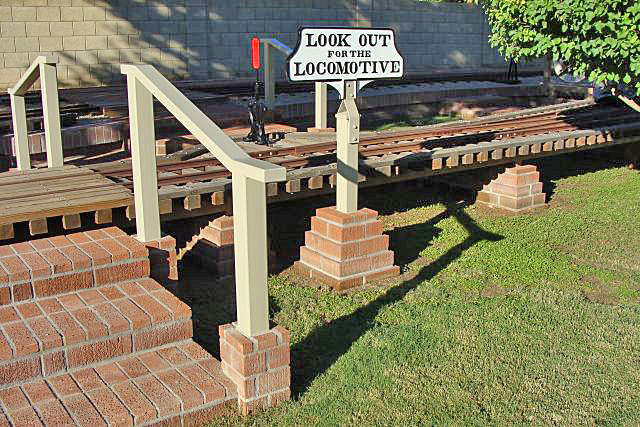
|
We re-treated the teak flooring and seats in gons Nos. 218 and 219 with teak oil, sanded and refinished the pump car and repainted the track inspection car.
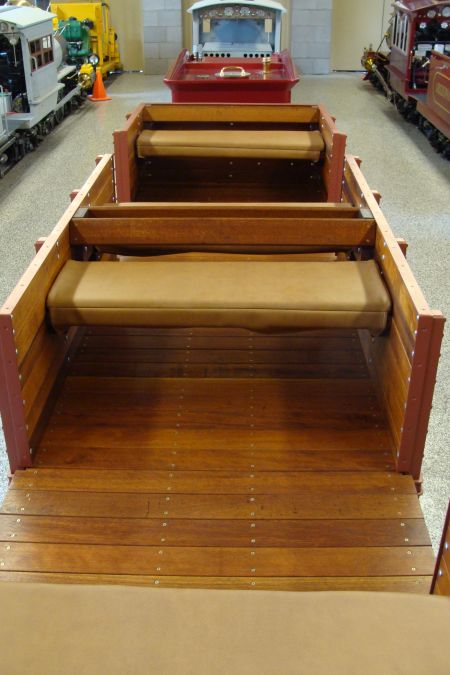
|
We lubricated our switches and switch stands and replaced a few ties that needed retired
We started an ambitious project in 2012 to rebuilt all of our A & P and F & MV wheel and axles sets. In some cases it just meant repacking the axle bearings with grease. In others, it meant replacing the bearings, seals, axles and wheels. We finally finished this project as we rebuilt the last 4 sets of wheel and axle sets this year.
We fabricated three bases and posts for portable signs; I still need to get the final coat of paint on the signs themselves.
We spent quite a bit of time rebuilding and customizing our 1987 John Deere AMT 600. She sees some activity on the A & P and more around the local neighborhood.

|
Several of the engines received shop time; those projects are detailed by engine name.
We replaced the mechanical fuel pump on the Red River with an electric one and it seems to have solved "at least for now" our intermittent fuel issue.
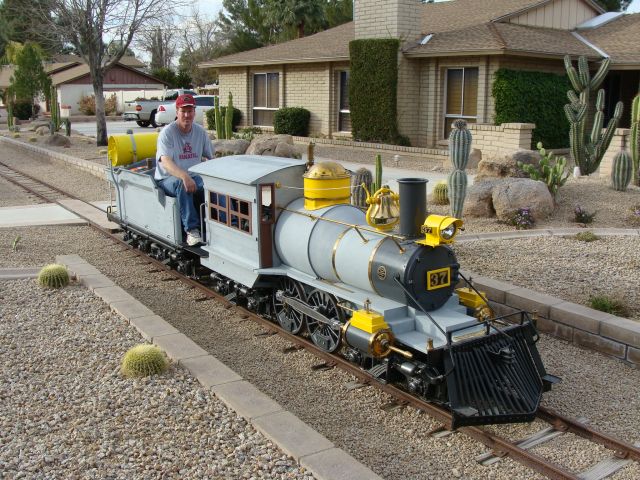
|
The Tucson saw a great deal of activity this year, but did not require much attention. We replaced the choke cable and rebuilt the carburetor to address a problematic needle valve. She has always been an easy starting engine and is back to starting the first time the engine turns over.
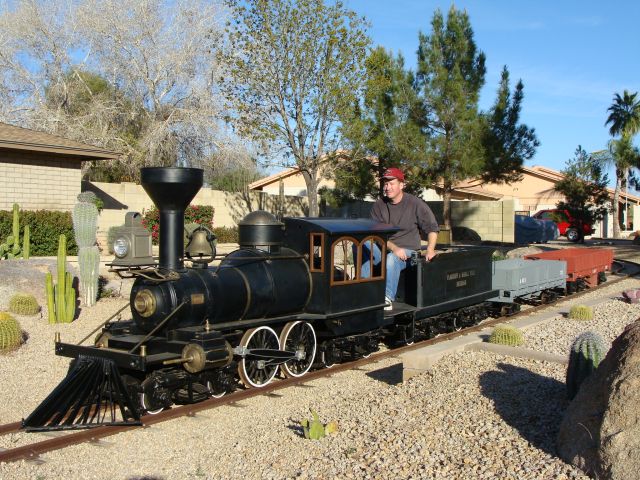
|
We removed the factory smokestack on the Coconino, shortened the stack and exhaust pipe, welded a cold-rolled 1/2 inch ring in place that we fabricated, filled the remaining holes and painted the stack. It looks exactly like the modified stack on No. 37, the Red River. Malcolm Mackey had long wanted the stack to look this way and we got to the project this year. The Coconino also saw a great deal of activity this year and ran very well.
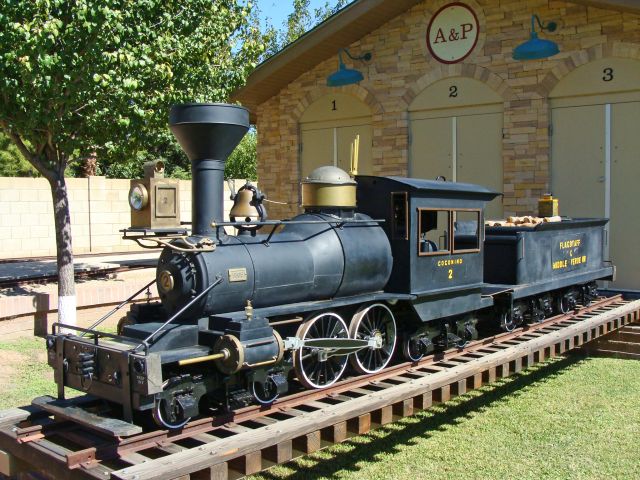
|
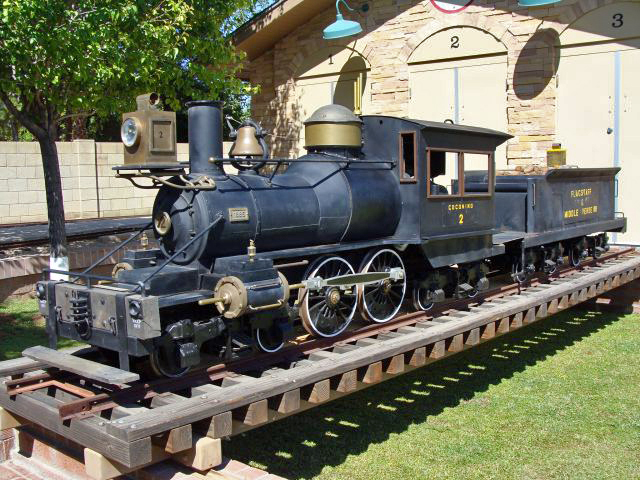
|
Our friend Ed Loesche was in town from Camp Verde, AZ and stopped by with some vintage film footage taken by his family of the Coconino when she operated at Playland Park in Rye, New York. Dave has captured a short segment of that film and added it to our video area and to YouTube.
Here's a 10 second clip of the Arizona and Pacific Railroad engine "Coconino" running at her original home in Rye Playland New York. Courtesy Ed Loesche
The majority of our work this year was on G-16 No. 582. When we bought her several years ago, we received a sheet metal body and a number of boxes with parts. We received maybe two-thirds of the parts and all of those needed refurbished or rebuilt. As time and money permitted, we acquired a few parts at a time and rebuilt what we had. It was a several year process.
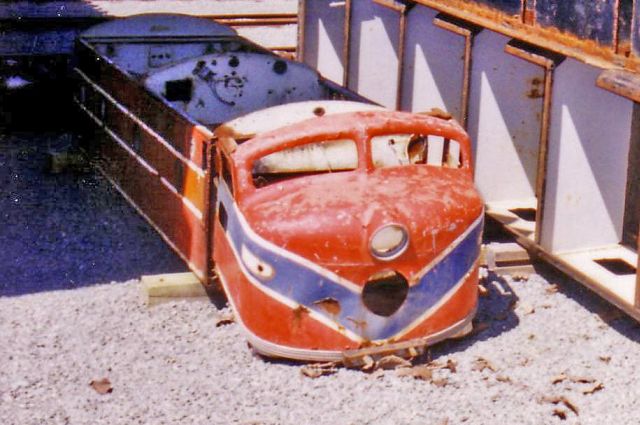
|
She had been on a rack in the garage for months as we worked out some of the final mechanical bugs. We rebuilt the transmission with
new gears and front and rear seals and installed her with high expectations. The transmission worked great, but leaked a lot of gear
oil from the case around the shifting shaft. We had to pull the transmission again and replace the new standard O ring with an oversize
double O ring. This is the sort of thing that you can't foresee, but you have to be committed to doing the job right. No one wants a
pool of gear oil under their operating G-16.
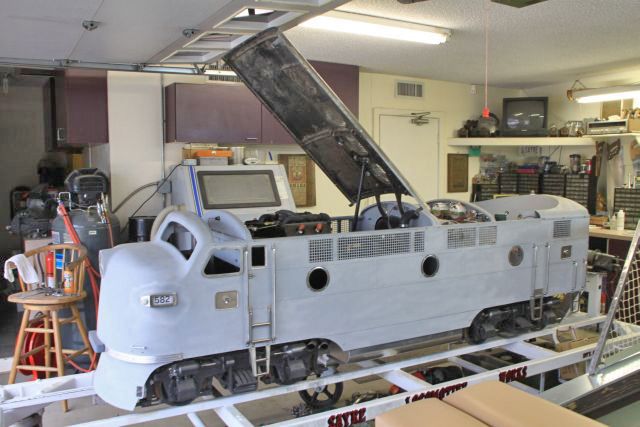
|
We added the cosmetic horns to the roof. I was lucky enough to acquire an original MTC Trico vacuum horn for both the A and the B unit this year. The horns with the old trumpet design look very cool, I'm not sure if we are going to hunt down the rest of the parts to make them operational or just install them for appearance sake.
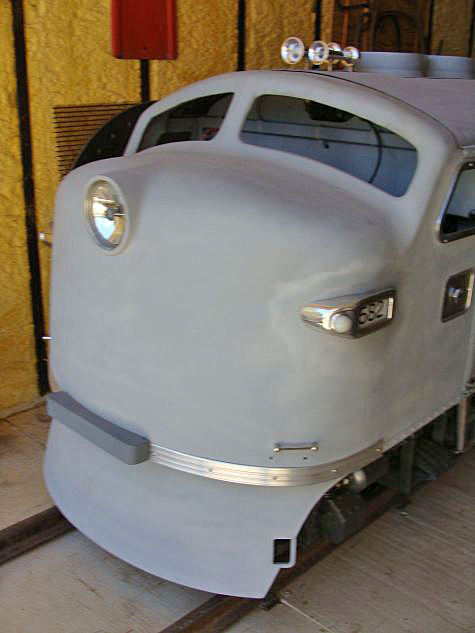
|
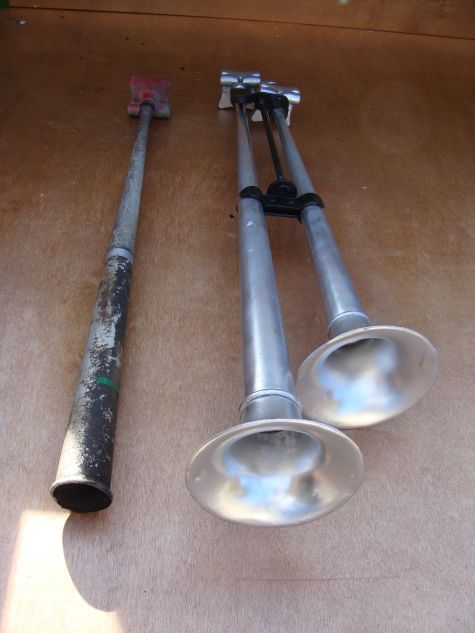
|
Dave installed a 30 amp fuse in the ignition circuit. Each of our other trains are fused and we wanted to have that extra security in case of a catastrophic failure.
We found and resolved two pinhole leaks in welds of the intake manifold and a leak around the butterfly shaft bushing of the carburetor that were affecting the throttle system. After making several repairs on the carburetor, it was replaced with one off of our parts shelf.
No. 582 made her first run on the A & P on April 13 with Dave at the controls. We had a few challenges getting her off the rack and onto the mainline, but we persevered. She is a great running engine and doesn't leak any fluids. We still have a minor vacuum leak on the brake side which I think is a balky vacuum canister, we will get that resolved in 2015.
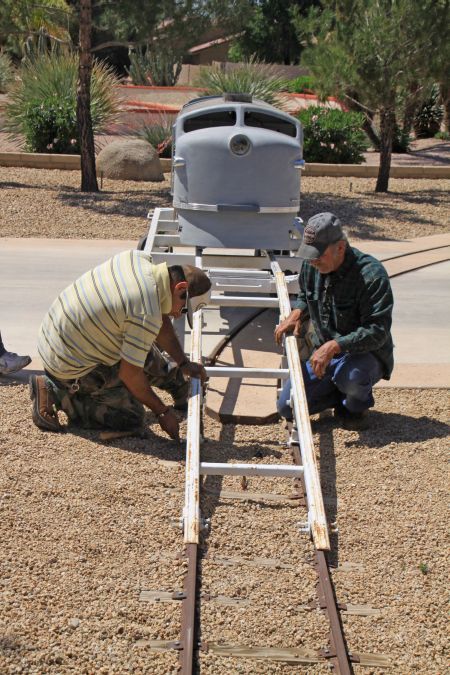
|
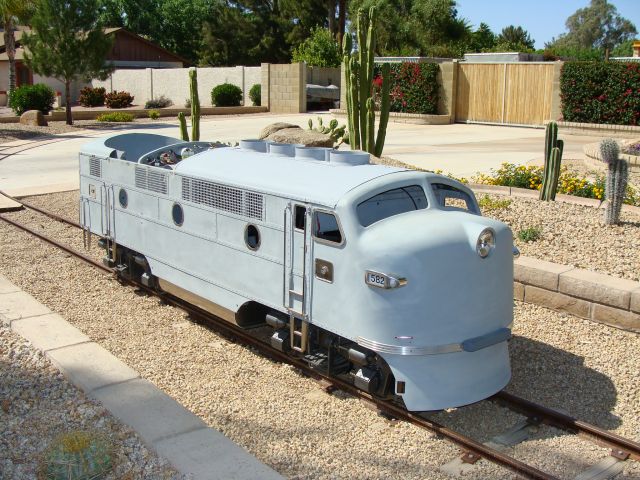
|
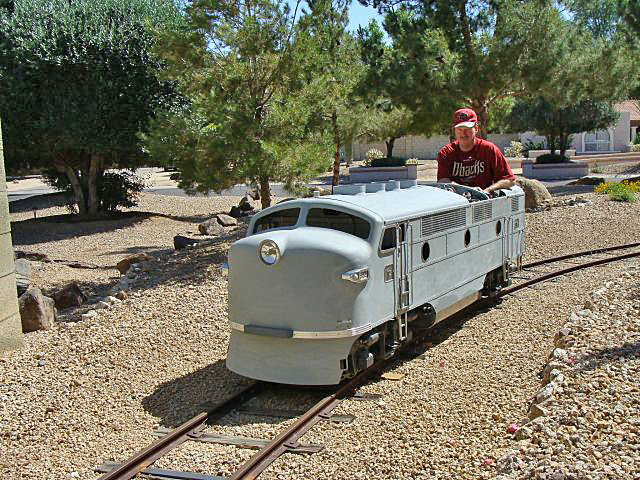
|
It was the highlight of the year having her back together and running on the A & P. Those of you that have been watching the incremental, but slow, progress on 582 over the years know what a huge project this has been. She was built in 1951; in 2014 she is again back in great mechanical shape and polishing the rails of the A & P.
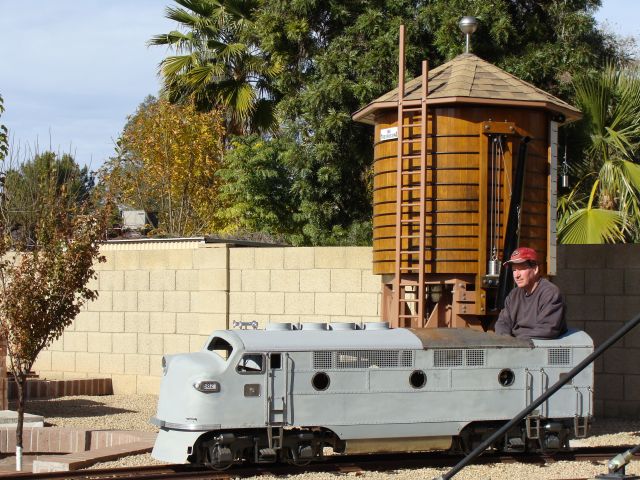
|
We have continued our research over the last year into the number of B units manufactured. We believe there were 39 "Limited" train sets produced by the Miniature Train Company. The "Limited" model had two power units either two "A" units or powered A and B units. It is unknown exactly how many "B" units were produced, but for various reasons we believe the number to be 32. Of those, less than half are still accounted for and in good condition. We feel fortunate to have one of the B units and are spending the time and money to try and bring her back to great condition.
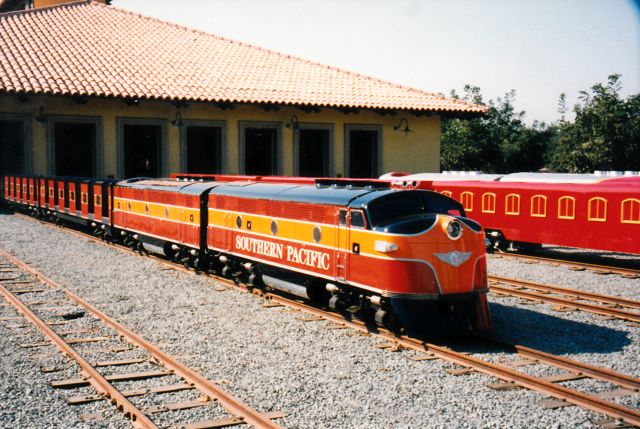
|
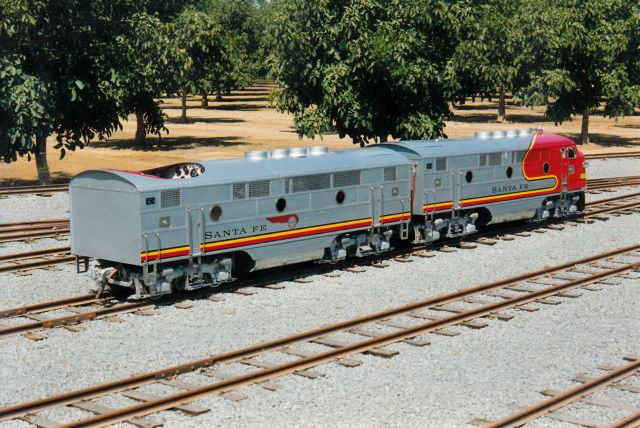
|
There are at least four versions of the instrument panel in the B units and they range from seven to thirteen gauges. We have the thirteen gauge model which is very cool looking, just a bit more expensive and problematic to restore... We have located and acquired all the NOS switches and push buttons and have purchased all the Stewart Warner blackface gauges.
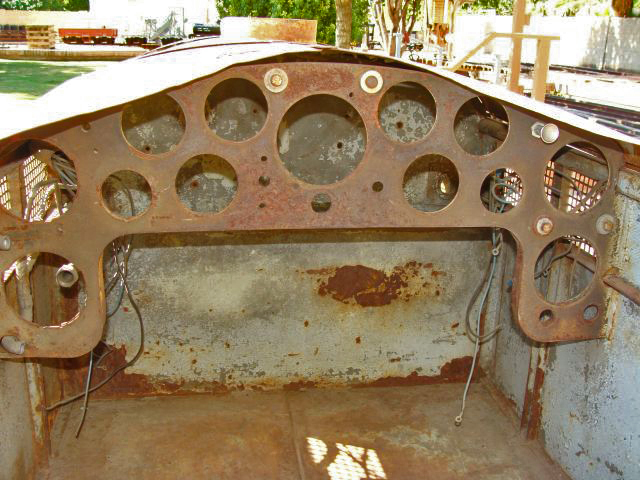
|
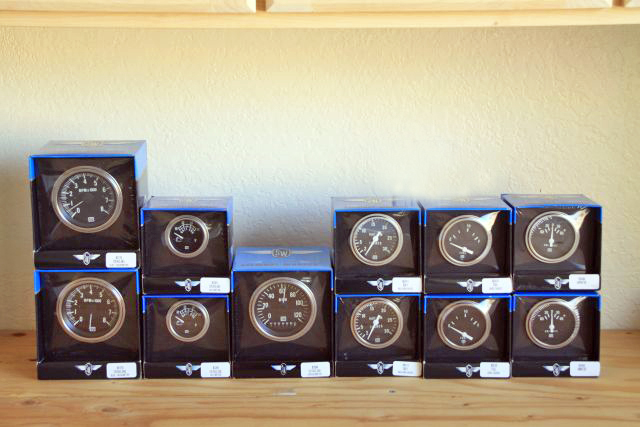
|
We made quite a bit of progress on the B Unit this year even though it isn't all readily observable.
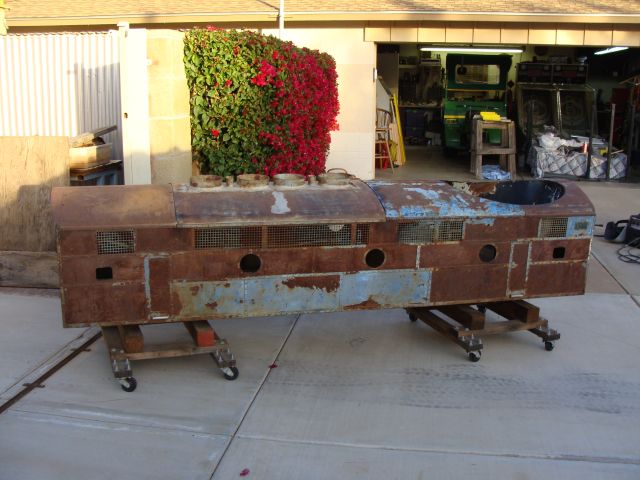
|
We painted the Velvac vacuum valves that will be mounted in the cockpit. The red is the brake and green is the throttle just as in the A unit. These valves will not be tied into the brake or throttle system, but will give "junior engineers" the opportunity to learn the operation of MTC equipment and learn that safety starts at an early age. We are fabricating the mounting brackets as one of the prior owners cut out the original brackets. We added four body ribs that will add strength for the hood hinges and the hood latch and release. We installed the hood hinges that we fabricated. It is several hours work cutting the access slots, welding the tabs to one of the new ribs and getting them in place level and square.
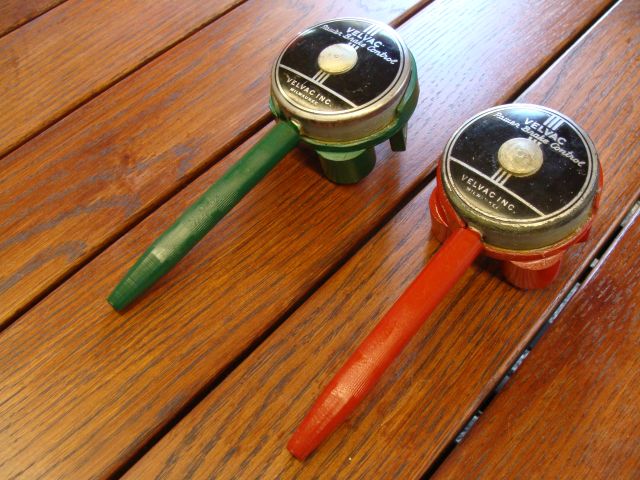
|
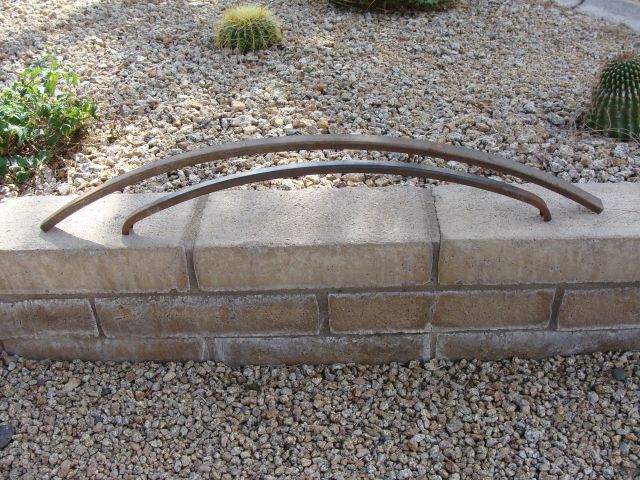
|
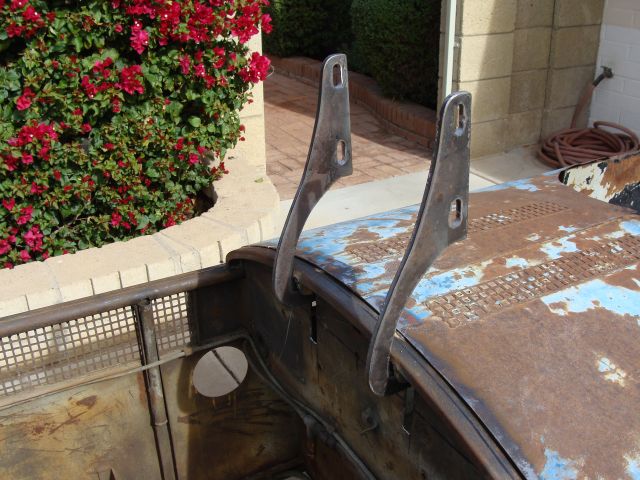
|
The main B unit body had a bit of a tweak in it and the seat assembly was twisted. We got those components straight and happy. The cowl panel was flattened as if people had stood on it over the years. We got the proper curvature back in it. The front top sheet metal panel was missing. A panel was fabricated a few years ago, but it still needed fitted, cut up the middle, tacked in place and the flat bar trim welded in place. We got those things accomplished.
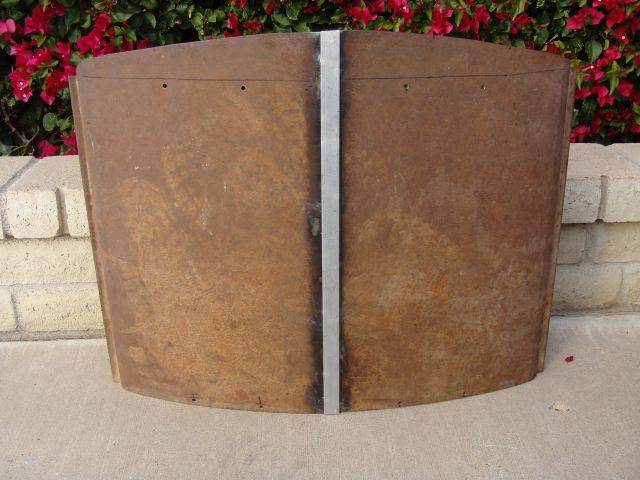
|
We rebuilt and painted the trucks two years ago and they will go under the B rather quickly, but there are still nearly a hundred items on the "to do" list. Some of the remaining items will be quick, but most not so much.
We still have a long way to go, but this will be a fun and rewarding project. We will keep plugging away one item at a time. We hope to have her on the rail late in 2015.
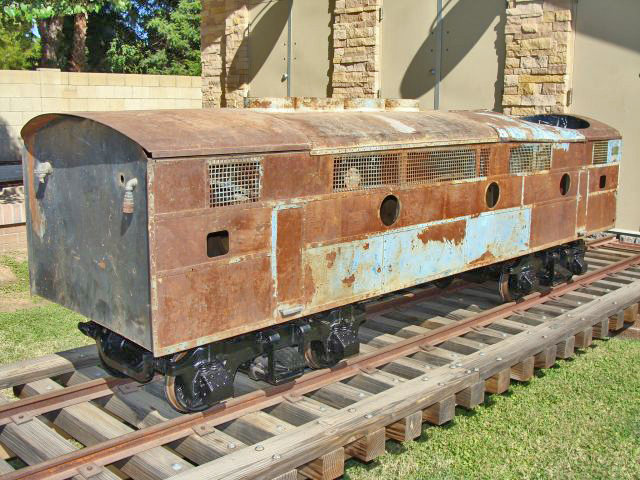
|
We started on the track inspection car seat widening and repainting project. We got a good start and will finish in January. After the repainting is complete, we will have seat and back cushions made and upholstered.
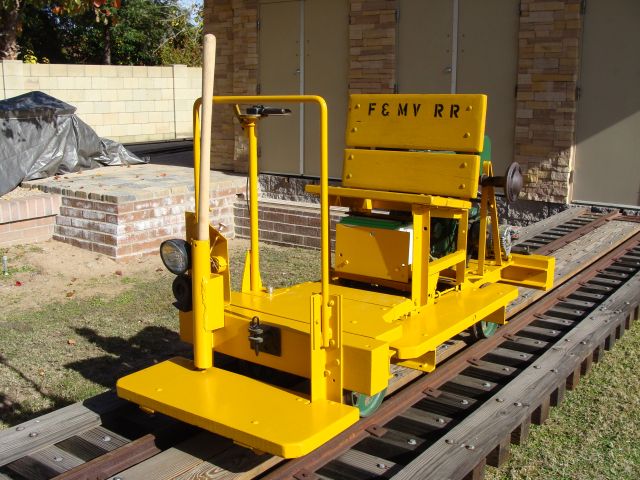
|
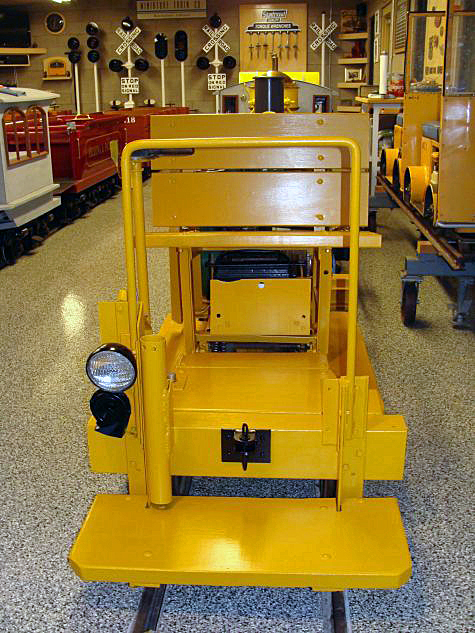
|
The starter mounting bracket had become loose and the fuel line had become old and petrified. It had several deep cracks and was starting to leak gasoline onto the alternator - a recipe for disaster. The starter had to be removed to tighten the bracket and then be reinstalled. We accomplished that task, installed a new fuel line and fittings and adjusted the idle.
We did not make any progress on our G-12 this year. We are still looking for a number of components to complete this engine and I would like to restore it as close to original as possible. The primary components I am missing and looking for are: the front drive truck, the front drive line, an original motor with both clutches, the roof-mounted horns and the throttle handle.
Ideally, someone out there will have replaced the original motor and dual clutches set up with a new unit and modern technology and have the original sitting in the corner of a shed somewhere. If any of you know the location of any of these parts shoot me an email.
We added two additional MT& RR Co. torque wrenches
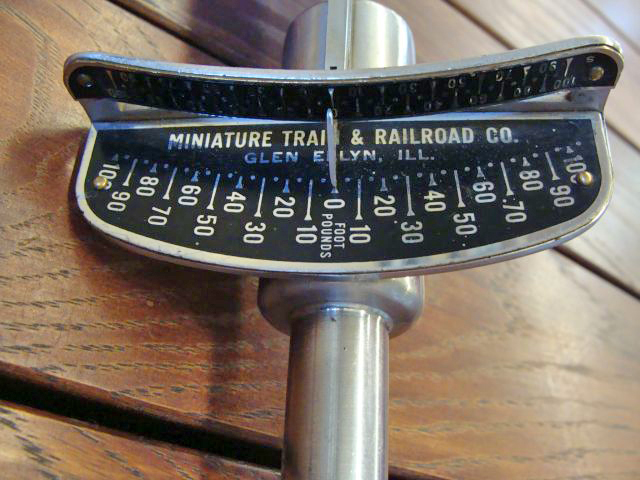
|
We found a photo of the first run of the Tucson after the F & MV golden spike ceremony in 1991. It is framed and on display.
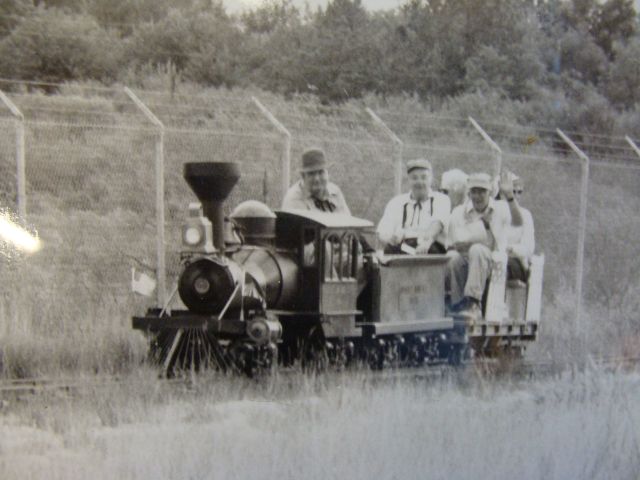
|
We added another long spout oil can to our collection and display.
We have some location signs from the F & MV RR that we will be mounting and displaying in our engine house in the months ahead.
We took quite a bit of video this year of our various trains in operation as well as some video of trains running at other locations. Dave has gotten very good at editing and adding video to YouTube. Hopefully, you enjoy watching the videos that he has put together.
We refinished our windbell tree.
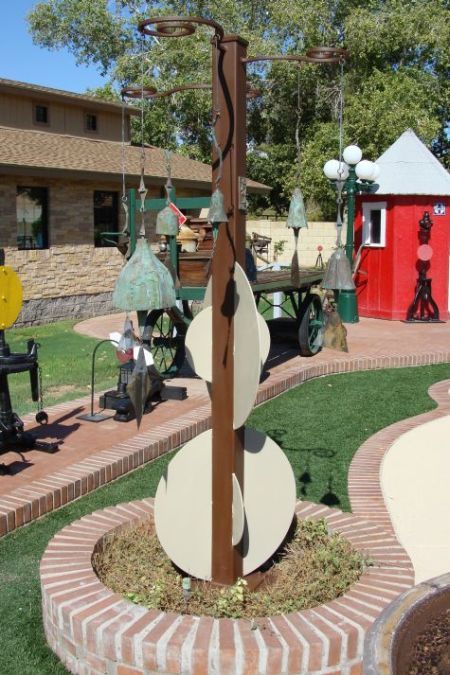
|
We added additional solar lights around the main patio and near one of the sets of steps.
Dave and I had the opportunity to visit several large-scale railroads during our trip to Northern California in June. We visited:
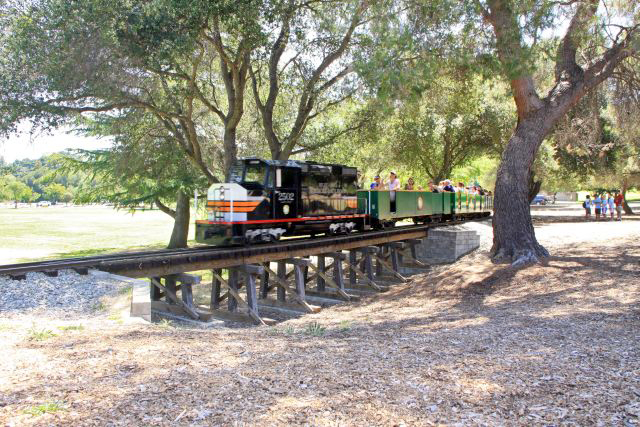
|
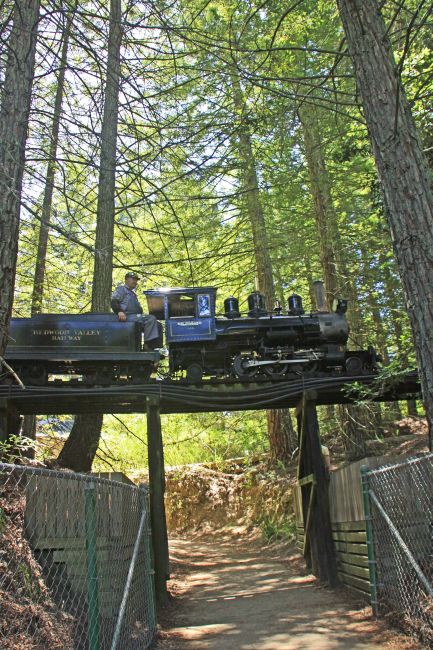
|
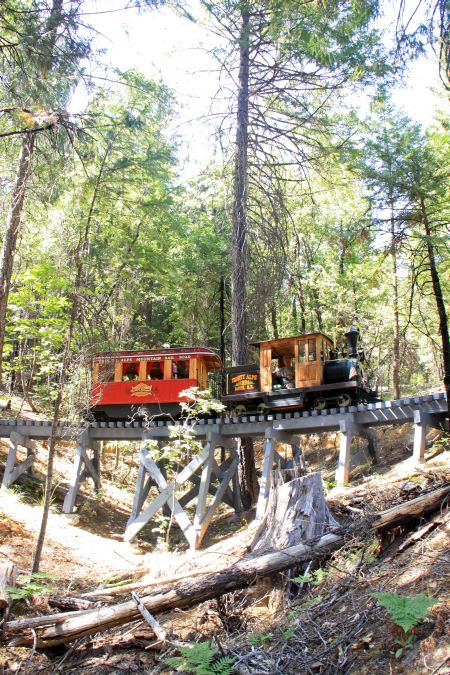
|
The railroads Dave and I visited in Arizona were:
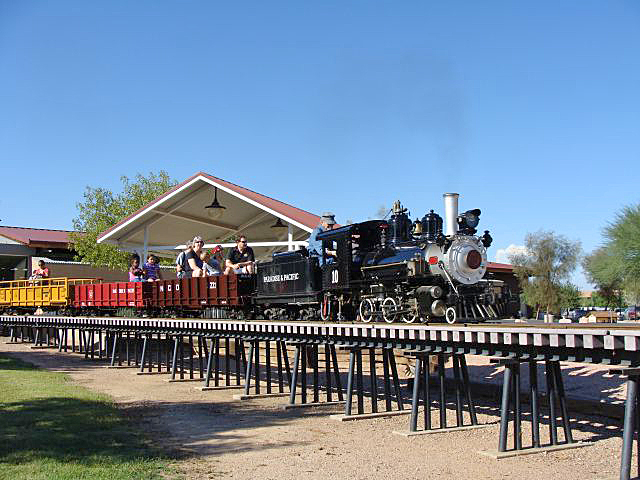
|
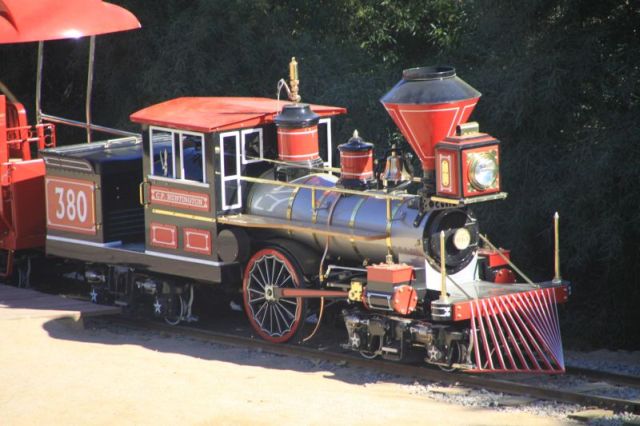
|
Time permitting, it is always fun to have people over and share the railroad experience. It is especially fun when they are fellow large-scale railroad owners and operators as they have shared so many of the same experiences and 99.9% of them are great people. We had a great number of visitors this year both locally and from out of state.
The out of state cities represented this year, in no particular order, were: Richards, Texas; Albuquerque, New Mexico; Stevens Point, Wisconsin; Rochester, Minnesota; San Diego, California; Portland, Oregon; Minneapolis, Minnesota; Pittsburgh, Pennsylvania; Hampstead, New Hampshire; Seattle, Washington; Chatsworth, California; Waterman, Illinois and Robinson, Illinois.
Within Arizona: Anthem, Flagstaff, Prescott, Camp Verde, Surprise, Avondale, Litchfield Park, Casa Grande and most of the cities in the Phoenix metro area were represented.
On many visitor's first trip to the A & P, they are surprised at just how crazy I am to have built all of this into my backyard - but in a good way.
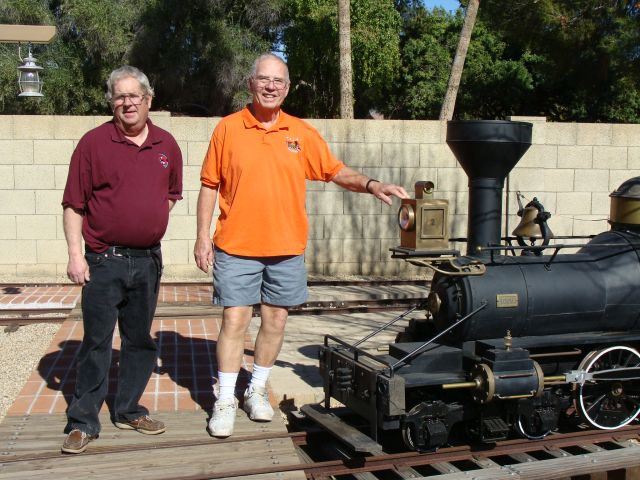
|
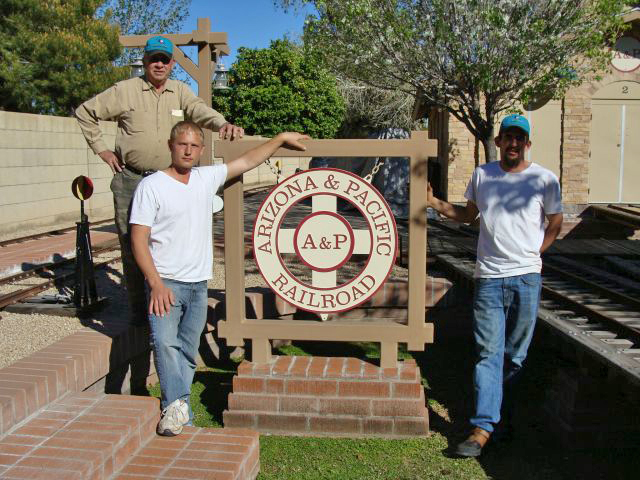
|
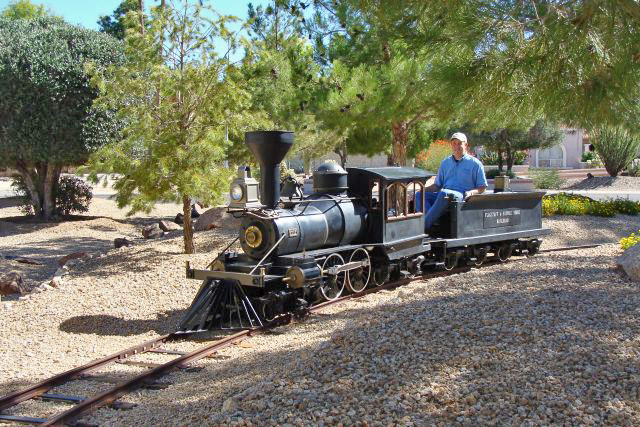
|
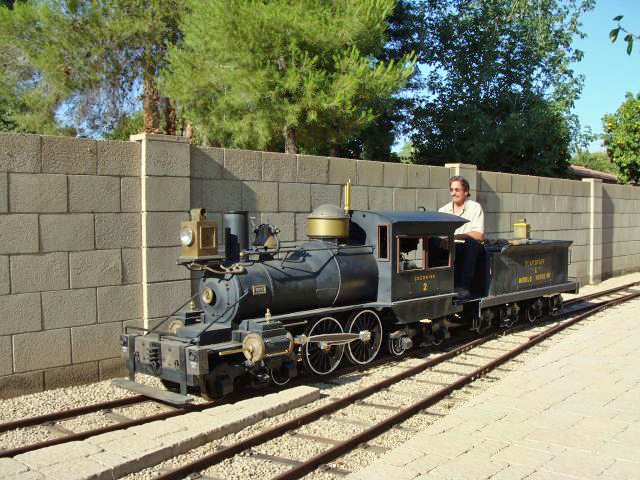
|
We had a very productive year in 2014 and have lots of plans for 2015 and beyond including:
As with every year, it is a pretty ambitious list. Hopefully, we’ll get through at least half of it. The painting projects in particular will likely get bumped another year as we work on the G16 A and B and maybe add a couple of storage buildings. We are a small group on the A & P and sometimes it takes awhile to get major projects accomplished. It is mostly Dave and I working on these projects. I get some machine shop and fabrication help from Jerry, brick and block help from Ruben and labor help from Eddie.
Our A & P website has been on the web now for 12 1/2 years. We have outlasted dozens of other sites and still are out here plugging away. It isn't always pretty. The updates are sometimes a little late depending on the work load of the real job and some of the work out here just isn't very sexy or photogenic, but has to get done.
The interest in the website continues to amaze me. We are just two guys in Arizona sharing information and writing about our weekend railroad projects and we get thousands of web visitors a year checking in from all over the world to see what we’re working on and the progress of our Allan Herschell and Miniature Train Company projects. We passed the 100,000 visitor mark early this year and finished the year with over 107,000. I know some of you have been watching our progress for ten years or more and have lived this journey with us. Thank you for watching. We had 9,000+ visitors to the site in 2014.
We lost our dear friend Malcolm Mackey who passed earlier this year. He was a huge supporter of the A & P and the man who got us started with MTC and AH equipment twenty some years ago. In many ways, his vision lives on here at the A & P.
Another long time supporter and friend of the A & P, Erich Kimble has moved to a nursing home as the result of serious health issues. He designed and fabricated many of the parts in use on equipment here and was one of the best aluminum welders and fabricators in the state.
The newest member to join the A & P team is Dave's yellow lab puppy Olive. She isn't very good yet at fabricating or painting projects, but is very skilled at moving ballast - one rock at a time...

|
This September (2015) will be the 20 year anniversary of me buying my first Allan Herschell train - the Phoenix and she was such a mess. She was very expensive to me at the time and I had no idea how much I didn't know. It is hard for me to imagine not going down this road now. I enjoy bringing these machines back from the derelict, researching and embracing their history and then having the opportunity to share the trains and my experiences with others.
I think we have proven you don't need 40 acres, a crew of dozens or have to be a Rockefeller Trust recipient to own and operate a large-scale train. There are plenty of those operations out there and I am happy for them too, but the guy working out of his garage and chasing down parts at swap meets and through contacts and making parts he can't find can do this too! I hope through our work (Dave and I) that we inspire more folks to get into this hobby and get more young people interested in large-scale trains.
Have a Great New Year and Happy Railroading Everybody!